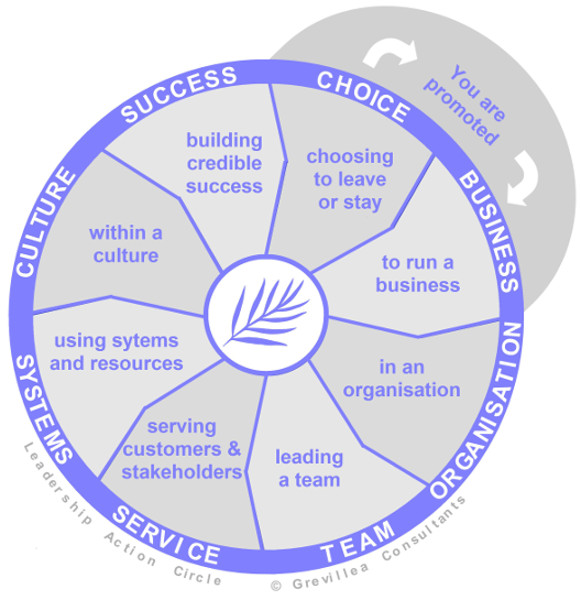Power, people and protocol during transition
Action
Establish balanced working and communication patterns with your boss, who is the key relationship and hub of influence for your work. Use formal and planned interactions initially until you and your boss build a rapport and share an understanding about how you work together. Involve your boss in key planning and decisions to draw out what you hold in common or and differences that need be managed.
Risks/Opportunities/Surprises
People sometimes wait for the boss to take the initiative. This can send the wrong message, eg. You're a loner or you don't value your boss' input.
A fear people sometimes have is that they don't want to appear needy. This can stop them seeking feedback from their boss. This feedback is important to help align expectations, priorities, effort and results.
Establish balanced working and communication patterns with your boss, who is the key relationship and hub of influence for your work. Use formal and planned interactions initially until you and your boss build a rapport and share an understanding about how you work together. Involve your boss in key planning and decisions to draw out what you hold in common or and differences that need be managed.
Risks/Opportunities/Surprises
People sometimes wait for the boss to take the initiative. This can send the wrong message, eg. You're a loner or you don't value your boss' input.
A fear people sometimes have is that they don't want to appear needy. This can stop them seeking feedback from their boss. This feedback is important to help align expectations, priorities, effort and results.
Action
Identify key stakeholders and influencers and establish good rapport, relationships and protocols. Address how your business operations affect and/or depend on each other's decisions, people and performance.
Risks/Opportunities/Surprises
No business operates in isolation. A major predictor of a failing transition is when leaders in new roles don't build a network of key relationships.
Identify key stakeholders and influencers and establish good rapport, relationships and protocols. Address how your business operations affect and/or depend on each other's decisions, people and performance.
Risks/Opportunities/Surprises
No business operates in isolation. A major predictor of a failing transition is when leaders in new roles don't build a network of key relationships.
Action
Identify who are the most influential stakeholders to help your priorities to succeed. Get them on board with your goals. This may include meeting with them and finding ways that your goals can reinforce theirs.
Risks/Opportunities/Surprises
Building alliances and coalitions requires negotiation and willingness to make reciprocal commitments. This requires negotiation skills and openness to revising your own expectations while not compromising on a drive to get results. It is important, particularly when new to an organisation, to avoid rigid assumptions about how objectives can be achieved.
Identify who are the most influential stakeholders to help your priorities to succeed. Get them on board with your goals. This may include meeting with them and finding ways that your goals can reinforce theirs.
Risks/Opportunities/Surprises
Building alliances and coalitions requires negotiation and willingness to make reciprocal commitments. This requires negotiation skills and openness to revising your own expectations while not compromising on a drive to get results. It is important, particularly when new to an organisation, to avoid rigid assumptions about how objectives can be achieved.
Action
Work with peers that also report to your boss. Clarify what you expect from each other. Identify ways to work together or support each other to deliver the outcomes your boss is seeking. Consider extending this out to other peer level people in the organisation who report to other bosses but have related business needs.
Risks/Opportunities/Surprises
A little effort to take the initiative with peers creates goodwill and a positive image that can produce cooperation later on.
Your boss wants a self-reliant team of leaders. This means a team commitment to cooperate and create solutions with each other is a major asset for your boss. This is facilitated if you develop realistic, workable expectations with each other.
Work with peers that also report to your boss. Clarify what you expect from each other. Identify ways to work together or support each other to deliver the outcomes your boss is seeking. Consider extending this out to other peer level people in the organisation who report to other bosses but have related business needs.
Risks/Opportunities/Surprises
A little effort to take the initiative with peers creates goodwill and a positive image that can produce cooperation later on.
Your boss wants a self-reliant team of leaders. This means a team commitment to cooperate and create solutions with each other is a major asset for your boss. This is facilitated if you develop realistic, workable expectations with each other.
Action
Peers are influential in how you are seen in an organisation and a source of opinions for your boss about your proposals. Build relationships and rapport with peers and develop your understanding of their business responsibilities and processes.
Risks/Opportunities/Surprises
With the limited time you have available in any day there are always trade-offs as to who you give attention. Understand that each decision generates consequences later on. Some relationships that don't appear to have any immediate significance may be important later on.
Peers are influential in how you are seen in an organisation and a source of opinions for your boss about your proposals. Build relationships and rapport with peers and develop your understanding of their business responsibilities and processes.
Risks/Opportunities/Surprises
With the limited time you have available in any day there are always trade-offs as to who you give attention. Understand that each decision generates consequences later on. Some relationships that don't appear to have any immediate significance may be important later on.
Return to the Overview page.
